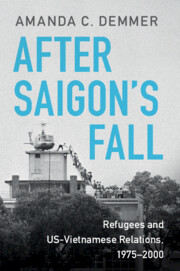Book contents
1 - The Fall of Saigon
from Part I - 1975–1980
Published online by Cambridge University Press: 08 April 2021
Summary
That 130,000 Vietnamese evacuated alongside US personnel in April 1975 was neither haphazard nor unanticipated; the Ford administration fought vigorously for precisely this outcome. The sheer horror of the fall of Da Nang in late March shook US officials out of their complacency and forced them to confront South Vietnam’s imminent collapse. From the beginning of earnest, if belated, evacuation planning, administration officials labored to include South Vietnamese allies, which made the process much more contested than it otherwise might have been. In the face of consistent opposition, the administration ensured that it had the authority to use the US military to evacuate South Vietnamese nationals as well as the legal approvals necessary to resettle those individuals in the United States.
Ford argued that the United States had a “profound moral obligation” to its South Vietnamese allies. While depicting the obligation as moral rather than legal permitted the United States to frame the evacuation as a rescue rather than a withdrawal, invoking morality also fashioned the American obligation in ways that did not have obvious limits, temporal or demographic. Future nonexecutive actors seized on this language to successfully expand resettlement opportunities for growing numbers of South Vietnamese.
- Type
- Chapter
- Information
- After Saigon's FallRefugees and US-Vietnamese Relations, 1975–2000, pp. 23 - 58Publisher: Cambridge University PressPrint publication year: 2021
- 1
- Cited by

